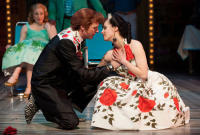A few weeks ago I was lucky to get a weekend away in Ashland. While I was there, I was able to see the Oregon Shakespeare Festival’s production of Taming of the Shrew. This hilarious, high-energy play was pure entertainment from the opening rock n’ roll song to its closing ballad. Director David Ivers sets the scene on a boardwalk complete with a roller coaster, Ferris wheel, and a tunnel of love. Petruchio is a rock star, covered in tattoos which suits his haughty and unruly character. He meets his match with Kate, who is outspoken and has a tough-as-nails attitude all the way through.
While both strong-headed characters start out clashing, eventually we see their relationship evolve into what can be summed up with some basic math—two negatives make a positive. The production interpreted this controversial play as a true love story. Kate’s long monologue at the end cements the trust that blossomed between the newly-weds. Other interpretations of the play have used the monologue to reveal a woman manipulated and tamed into submission.
But as I mentioned, this play is controversial and the controversy did not go undiscussed by your Bard’s Book Club a week later.
We were split on whether this was a romantic love story or a cruel portrayal of female subjugation. After all, Petruchio drags Kate through the mud, starves her, and deprives her of sleep, seemingly to get her to behave as he wishes. We saw that Kate stops fighting him back and discussed that textually her lines become shorter and passive.
To add to the debate, Hannah found an article which cites a defense for Petruchio by pointing out the references made by Shakespeare to the practice of falconry. To tame birds of prey, both owner and animal endure the same deprivations. In the text, it fits that Petruchio keeps Kate awake, therefore not sleeping himself, and when she doesn’t eat, he doesn’t either. On the one hand, we can see the falconry analogy as one of equality promoting the strong and intense bond that is created, but on the other hand, we see the obvious problems (if the language of “owner” and “animal” weren’t bad enough). Kate is his wife, not an animal that needs to be socialized.
The play is ultimately left up to us, the audience (or reader), to decide. The four of us ended up divided on how to interpret the play, especially Kate’s controversial monologue. I personally believe Kate and Petruchio end up having a strong and loving partnership. Textually, throughout most of the play, Kate’s lines are fairly short. No one, especially her father, gives her the room to truly express herself. The men cut her off or ignore her because of her shrewishness, and this same back and forth continues. It is in her divisive monologue that she is given the space and time to truly share her feelings, and it is Petruchio who lovingly allows her to do so.

